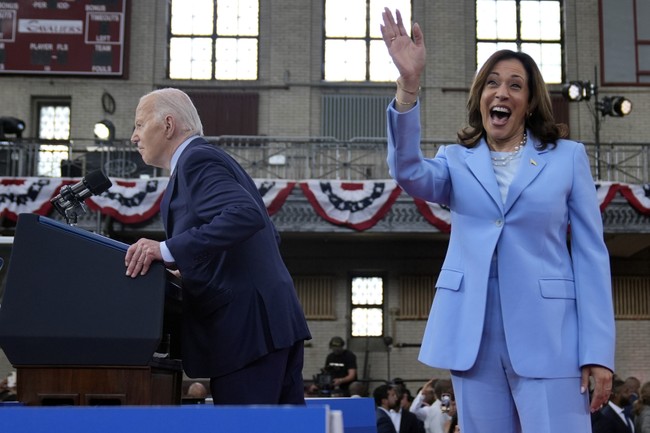Biden's Exit: A Shift for US Democracy
President Joe Biden emphasizes the importance of preserving democracy as he steps down from the 2024 presidential race, advocating for a new generation of leadership.
Published July 26, 2024 - 00:07am

Image recovered from washingtonexaminer.com
In a historic decision, President Joe Biden addressed the nation on Wednesday to explain his unprecedented choice to withdraw from the 2024 presidential race, marking him the first incumbent president since Lyndon Johnson in 1968 to do so. The televised Oval Office address emphasized Biden's belief that stepping down was the best way to unite the nation and safeguard its democracy.
Biden acknowledged the pressure and deliberation leading up to his decision. Internal polling had suggested he might lose to Republican nominee Donald Trump, which would adversely impact fellow Democrats. Despite his confidence in his record and vision for America's future, he stated that nothing could supersede the task of saving democracy. His address was imbued with reverence for the office of the presidency and a deep sense of patriotism.
“I revere this office,” Biden said, “But I love my country more.” This sentiment echoed throughout his speech, reflecting Biden's understanding of the gravity of his decision. He drew upon historical references, quoting Benjamin Franklin on the fragility of republics and the vital role of the people in preserving democratic governance.
“The choice this fall is not between Harris and Trump, but between continuing to have a functioning democratic system of government or not,” Biden articulated, urging voters to support Vice President Kamala Harris, whom he lauded as a capable and tough leader. He positioned his departure as a necessary step to offer new and younger voices a platform, asserting that it was time for a generational change in leadership.
The days leading to his decision were marked by significant introspection and a response to the widespread calls from within his party. His debate performance in June was notably shaky, leading to doubts about his capability to defeat Trump and continue serving effectively. Biden's eventual conclusion that passing the torch was the best path forward was framed as a move to unify the nation and preserve the democratic integrity of the office.
Biden's address also served as a repudiation of Trump, who continues to dispute the 2020 election results and has been a central figure in divisive political rhetoric. Biden referenced the January 6th Capitol insurrection as a pivotal moment that underscored the peril to American democracy, reinforcing his stance that defending democratic institutions was paramount.
Amidst these declarations, Biden outlined an ambitious to-do list for his remaining time in office. Priorities include resolving the conflict between Israel and Hamas, advancing efforts to cure cancer, addressing climate change, and pushing for Supreme Court reforms. However, the effectiveness and reception of these initiatives will likely weigh heavily on the outcome of the upcoming election.
Harris, as the successor Biden endorses, stands on the brink of a historic campaign. Biden's support will be critical, though his participation will be limited, acknowledging his diminishing public approval and the shifting dynamics within the Democratic Party. The transition of leadership hinges on Harris's ability to leverage the accomplishments of the current administration while presenting a compelling vision for the future.
On the other side of the political spectrum, Biden's exit has prompted varied reactions. Former Illinois Governor Rod Blagojevich sharply criticized the decision, accusing figures like Barack Obama of orchestrating Biden's removal through backroom politics. Blagojevich's claims about Chicago-style political maneuvering underscore the contentious and multifaceted nature of Biden's departure.
Biden's legacy, therefore, is intimately tied to Harris's success. Should she win, Biden will be remembered for his strategic and selfless decision to step aside, ensuring continuity and stability in American leadership. If her campaign falters, critiques of Biden's exit and its timing will likely intensify, spotlighting the complexity of political transitions in the highest office.
As Biden concluded his address, he expressed gratitude for the opportunity to serve and underscored his commitment to the democratic ideals that shaped his presidency. The address, carried by major broadcast and cable news networks, marks a significant moment in American political history, setting the stage for the next chapter in the nation's leadership.







